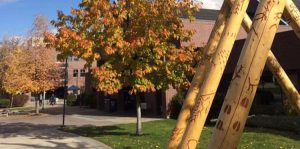In 2005, using Indigenous principles of learning, Associate Professor Donna Kurtz, Elder Jessie Nyberg, and Shawna Whitney, Indigenous nurse educator BC Centre for Disease Control (funded by the BC Ministry of Health Nursing Directorate) developed a cultural safety course curriculum for UBC undergraduate students. A few years later further funding was received by Dr. Joan Bottorff through the Aboriginal Health Human Resources Initiative (AHHRI).
Developed over 18 months, the Curriculum Writing Group consisting of Carlene Dingwall, Elder/Band Councilor Jean Brown, Diana Moar, Eric Mitchell, Chris Marchand, and former tribal chief Judy Maas, together co-developed the Aboriginal Health and cultural safety curriculum modules, named SWKNAQINX (Okanagan), to honour the Nation whose traditional unceded territory we live and work on as uninvited guests.
Drawing on the principles of Cultural Safety (Nursing Council of New Zealand, 2005), the four modules are based on Okanagan tradition and knowledge. They provide a critical exploration of cultural identity and racism (historical and contemporary) within health systems to help students develop competencies for improved sensitivity and responsiveness to Indigenous people within health care, research, institutions, and community.
This addresses the TRC Calls to Action in providing education to help students understand that the dominant discourse around health in Canada excludes Indigenous understanding and approaches to health. This limits the capacity of the current health care system and presents challenges in the delivery of health and social services.
Cultural safety practices guide learners to identify meaning through the exploration of socio-political and economic factors in health, illness, injury and death. Students, as global citizens, learn to understand diverse worldviews among cultural groups, and the impact of colonization on minority groups, especially Indigenous peoples. They critically reflect on the impact of personal, cultural, economic, historic, sociological and political factors on the health of individuals and populations that foster or compromise trusting and respectful relationships.
Students explore how cultural safety contributes to the achievement of positive health outcomes within four main themes – wellness, caring, health challenges, and prevention. Traditional Indigenous Knowledge Keepers and Elders use a healing circle for teaching to provide a more traditional (no books, desks, electronics) and culturally safe environment in the classroom and includes a community visit to a health centre on-reserve.
The modules are taught to all 3rd year School of Nursing students in the Faculty of Health and Social Development, by Knowledge Keepers, Elder Wilfred (Grouse) Barnes, and Elder Pamela Barnes. In addition, adjunct professors and Elders Chris Marchand and Eric Mitchell teach the modules in a Spring one week intensive course, offered across campus for undergraduate and graduate students, and in the Faculty of Critical and Creative Studies.
In 2008 the first cohort of third-year nursing students went through the course. Today, almost 3,000 nursing students have completed this now required course for nursing students. UBC Okanagan also offers a Cultural Safety in Health: Indigenous Perspectives course available campus-wide, not only within health disciplines.
Violet Ignace, a master’s student at the UBC Okanagan School of Nursing, has received an 2021 AGE-WELL Indigenous Graduate Student Award.
The AGE-WELL Indigenous Graduate Student Award will support her work in developing digital storytelling opportunities for and with Indigenous Elders and Knowledge Keepers. Building on existing relationships at six Friendship Centers and Métis Centers in British Columbia, Ignace will support the use of digital storytelling to support Elders to share and disseminate traditional knowledge and stories.
The University has developed a wide variety of programs and student services for “Aboriginal students”, including academic programs, admission policies, housing, and financial awards.
Self-identification is optional. If you are an Aboriginal person, we encourage you to self-identify so that you may benefit from these programs and services. We use the term “Aboriginal” in the spirit of its use in section 35(2) of the Canadian Constitution, to refer inclusively to members of First Nations, status and non-status, treaty and non-treaty Indians, Metis, and Inuit peoples in Canada, recognizing in doing so that many people prefer the terms that are specific and traditional to their communities.
Learn about self-identification
Aboriginal students meet the same competitive, broad-based admission criteria as other students
Aboriginal students meet all standard admission criteria for the BSN program, but have not quite met the competitive, broad-based admission score required to receive an offer of admission. In this situation, the applicant is very close to the required score (indicating a high likelihood of success in the BSN program). Students receive joint support from the School of Nursing and Aboriginal Supports and Services in the form of peer mentorship, peer tutoring, academic advising, etc. Students receive weekly tutoring in Biology and English. Some students take advantage of the Aboriginal Access Program, in which they enrol in a combination of Aboriginal Access Studies core courses and course options based on their intended degree program. In this program, prospective nursing students are advised to take the first year HINT 110 course. By entering through the Aboriginal Access Program, students’ course load is reduced in the first year of the BSN program.
